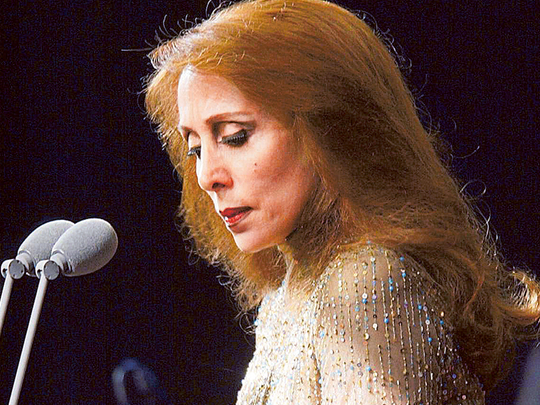
Dubai: For decades, almost all radio stations in the Arab world have been starting their morning broadcast with a Fairouz song. The tradition continues today even as the Arab diva, also known in this part of the world as ‘Our Ambassador to the Stars’, turned 80 years old yesterday.
Her songs have become sort of a romantic shelter in these violent times; to elevate us to a safe haven for a few minutes before we are hit with the daily dose of bad news; to help us maintain a balance between hope and despair; and probably feel good as her song ends with the beautiful girl and her knight in shining armour live happily ever after.
Nuhad Haddad, who became known later as Fairouz, was born on November 21, 1935, to a Lebanese family that is Christian Maronite and Syrian Orthodox, according to her website. She later converted to the Eastern Orthodox Christian faith when she married savvy musician Assi Rahbani, the eldest of the two Rahbani brothers who effectively shaped Fairouz’s career.
Unique path
Since her first song in the mid 1940s, the Arabs fell in love with Fairouz. In a career spanning more than six decades, she recorded nearly 1,500 songs, 85 CDs, 20 musicals and three movies. Although she began performing on air in the mid 1940s and produced her first album, Etab, in 1952, her first international appearance was in 1957, at Lebanon’s famed Baalbeck International Festival, alongside British prima ballerina Beryl Goldwyn and the Ballet Rambert. She was paid one Lebanese pound for that show, Fairouz reportedly said in an interview years later. But she won big. The concert established her as one of the biggest stars of that era when the Arab music arena was crowded with legendary names such as the great Umm Kulthoum, Shadia, Najat and Faiza Ahmad.
But Fairouz managed to chart a unique path for herself with the help of the Rahbani brothers. As most of the other Arab singers were lamenting the long lost love, Fairouz, probably influenced by Lebanon’s freedoms and democratic system, would sing for political and social rights as much as she did for love. Her musicals became manifestos for democratic champions in the Arab world just as much as her lyrics were part of love letters.
Dose of romance
During Lebanon’s 15-year Civil War, which started in 1975, Fairouz, unlike many of her contemporaries, didn’t leave her country. Her song, Raji’e Lebanon (Lebanon will be back) became a rallying call to rebuild the war-ravaged country.
She lost her husband and “best friend”, as she used to call Assi, on June 26, 1986 after a long illness. On that day, Lebanon’s warring factions declared a ceasefire and opened checkpoints to allow the funeral to move from Beirut’s Muslim west side, where the family lived, to the Christian east side of the capital, where he was buried. But the couple had actually been separated for seven years before that, allowing their son, Ziad, a talented musician, to be in charge of his mother’s music production.
Ziad composed dozens of the best of Fairouz, who, beginning in the 1990s, decided to slow down. Her latest albums would have less number of songs, contemplating life, society and politics. And being Fairouz, there is always the handsome dose of romance.
Her last album, produced in 2010, was titled, appropriately, Eh . fi amal (Yes, there is hope). Her son, Ziad, in an interview last year didn’t rule out a new one. Millions of her fans cling to hope.
Fairouz’s most famous collections:
Rajioun 1953
Songs from Baalbeck 1957
Albaalbakiya 1961
Ishar 1961
Good Friday Eastern Sacred Songs 1962
Jesr Elqamar 1962
Rings For Sale 1964
Andaloussiyat 1966
The Days of Fakhr Eddine 1967
Sah Ennom 1970
Fayrouz — Greatest Hits 1971
Fayrouz at the Piccadilly 1971
Jerusalem in My Heart 1971
Mais El Reem 1972
Loulou 1974
B’Hebbak Ya Loubnan 1976
Wahdon 1979
Shat Iskandaria 1987
Kifak Inta 1991
Mish Kayan Hayek T’Koun 1999
Fayrouz: Live in Dubai 2008
Eh Fi Amal 2010











